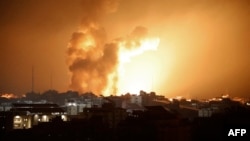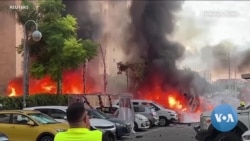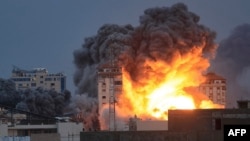Israeli Prime Minister Benjamin Netanyahu announced that Israel is “at war” after Hamas militants from Gaza fired thousands of rockets and sent dozens of fighters into Israeli towns near the Gaza Strip in a surprise Saturday morning attack, during a major Jewish holiday.
Israel launched airstrikes in Gaza killing at least 232 people and wounding 1,700 others, making it the deadliest armed response in years against the Palestinians, according to Israel’s national rescue service.
The response followed Netanyahu’s pledge to inflict an “unprecedented price” against Hamas militants, The Associated Press reports. The Israeli prime minister called for a mass mobilization of army reserves.
Hamas’ surprise attack killed at least 250 people, injured 1,500 others, and its militants went door to door abducting Israeli civilians. The unexpected incursion is also reminiscent of the surprise attack by Egyptian and Syrian forces against Israel 50 years ago almost to the day, igniting the 1973 Yom Kippur War that lasted less than three weeks and ended with Israel’s victory.
Why was it called the Yom Kippur War?
The latest of the Arab Israeli wars that shaped Arab-Israeli enmity in the region, the Yom Kippur War was ignited on Oct. 6, 1973. On the holiest day on the Jewish calendar, Yom Kippur, otherwise called the Day of Atonement, Israel was caught off guard by invading forces from Egypt and Syria. The 19-day war that followed has been considered one of the most traumatic events for the Israeli nation that vowed never to be caught off guard again and ended with Israel’s victory against the Arab forces and a subsequent armistice on Oct. 25, 1973.
The war also put into question Israel’s intelligence failure to offset the surprise attack, as well as the weak performance of the Israel Defense Forces during the war’s first few days and mobilized the Israeli people against the Golda Meir government at the time.
Why was Israel once again caught by surprise?
During its 50th anniversary, the Hamas attack raises again questions about Israel’s unpreparedness as it is dealing with domestic political issues once again.
The protest movement that has been mobilized against Netanyahu’s efforts to overhaul the country’s judicial system draws a parallel with Golda Meir’s fledgling government in 1973 and Israel’s government today.
Hamas’ unexpected attack came at a moment of deep division in Israel, as its government pushed through a contentious plan to reduce the power of the country’s courts, sparking a social and political crisis.
The move this summer also struck a nerve with the military, prompting many reservists — the backbone of Israel’s army — to warn they would not come if called up, to protest the changes to the judicial system. An IDF spokesperson said Saturday he did not know of any reservists refusing to be called up in the face of the latest attacks, CNN reports.
What is Hamas’ argument for attacking Israel?
After years in which Palestinians from Gaza often worked in Israel and moved freely in the country, Gaza has more recently come under blockade by both Israel and Egypt, penning more than 2 million people in a territory the size of Washington, D.C.
The Islamist group Hamas won Palestinian legislative elections in 2006. The Gaza strip has been ruled by Hamas ever since.
The shadowy leader of Hamas’ military wing, Mohammed Deif, said the assault was in response to the 16-year blockade of Gaza, Israeli raids inside West Bank cities over the past year, violence at Al Aqsa Mosque — the disputed Jerusalem holy site sacred to Jews as the Temple Mount — increasing attacks by settlers on Palestinians and the growth of settlements.
"Enough is enough," Deif, who does not appear in public, said in the recorded message, according to the AP, adding the morning attack was only the start of what he called "Operation Al-Aqsa Storm" and called on Palestinians from east Jerusalem to northern Israel to join the fight. "Today the people are regaining their revolution."
The attacks by Hamas follow one of the deadliest periods in the Israeli-occupied West Bank in nearly two decades. The violence has been driven by frequent Israeli military raids in Palestinian towns and cities, which Israel has said are a necessary response to a rising number of attacks by Palestinian militants on Israelis.
What was the U.S. reaction to the Hamas attack?
President Joe Biden has condemned what he says is the "unconscionable" assault by Hamas militants and his administration is pledging to ensure Israel has "what it needs to defend itself." Biden spoke after the unexpected strike that's drawing worldwide condemnation and anger from Israel’s allies.
At the White House on Saturday, Biden said he told Netanyahu that the United States "stands with the people of Israel in the face of these terrorist assaults. Israel has the right to defend itself and its people, full stop."
The president also warned Israeli’s enemies that "this is not a moment for any party hostile to Israel to exploit these attacks to seek advantage. The world is watching."
What is the reaction around the rest of the region?
Palestinian President Mahmoud Abbas told U.S. Secretary of State Antony Blinken that "injustice" toward Palestinians is driving the conflict with Israel to an "explosion," Reuters cited Palestinian news agency WAFA saying Saturday.
In a phone call, Abbas also stated the ongoing escalation is down to the "practices of the colonialists and the Israeli occupying forces, and the aggression against Islamic and Christian sanctities," according to WAFA.
In an effort to de-escalate the crisis, Egypt is in talks with Saudi Arabia and Jordan trying to defuse the Palestinian–Israeli tensions the Egyptian foreign ministry said Saturday, according to Reuters.
Egypt's foreign minister Sameh Shoukry, in phone calls with his Saudi and Jordanian counterparts, underlined the importance of "uniting international and regional efforts" to contain the escalating violence, a statement read.
Turkish Foreign Minister Hakan Fidan held calls Saturday with his regional counterparts to discuss the conflict between Israel and Palestinians, a foreign ministry source said, as Ankara said it stood ready to help de-escalate the situation, according to Reuters.
The source later said Fidan also discussed the situation with Blinken by phone, according to Reuters.
Earlier, Turkey's foreign ministry repeated President Recep Tayyip Erdogan’s call for restraint and strongly condemned the loss of civilian lives.
"We emphasize that acts of violence and escalation linked to these, benefit nobody," the ministry said. It also urged citizens in the region to remain in secure, indoor locations.
The conflict comes as Turkey, which has backed Palestinians in the past and supported a two-state solution to the conflict, along with Saudi Arabia, works to normalize ties with Israel after years of animosity.
Some information for this report was provided by Reuters and The Associated Press.








